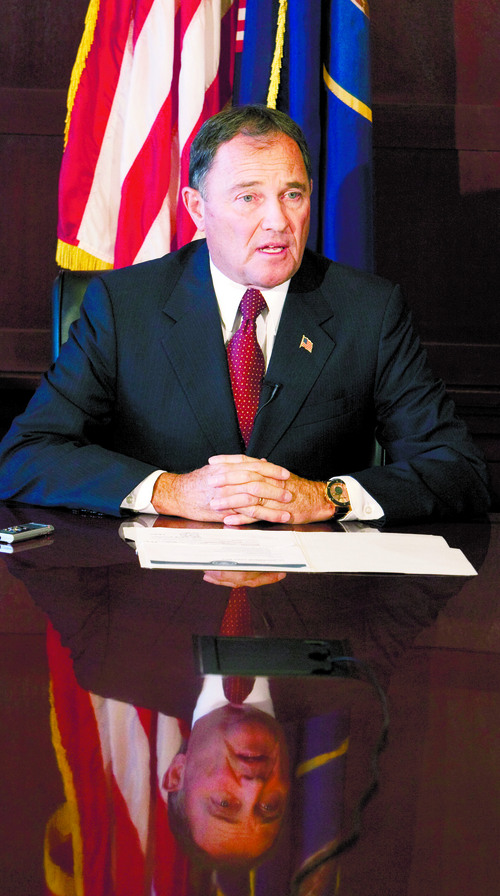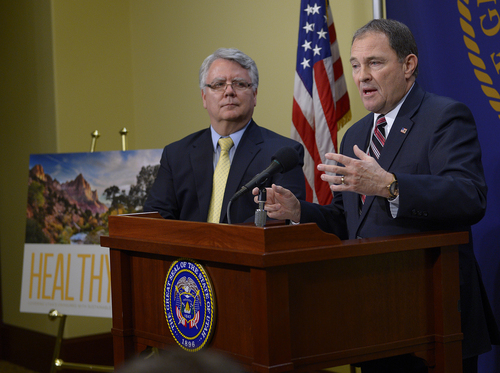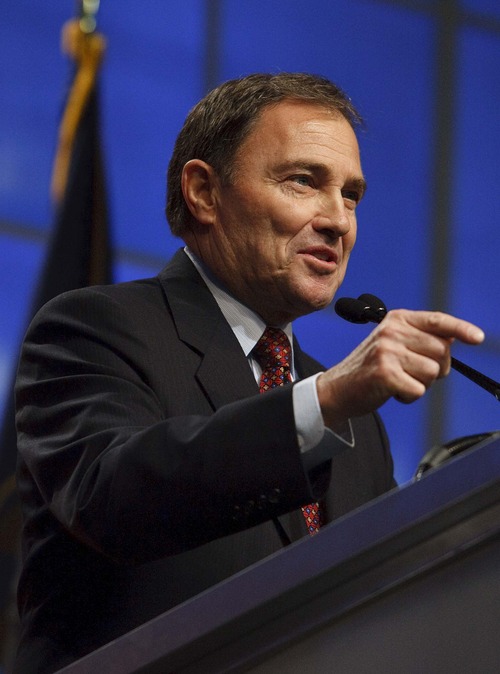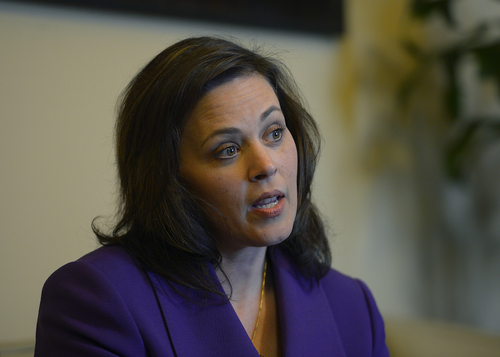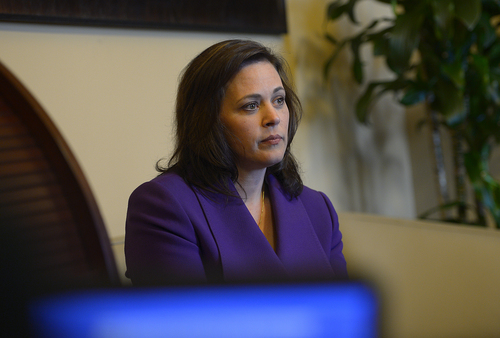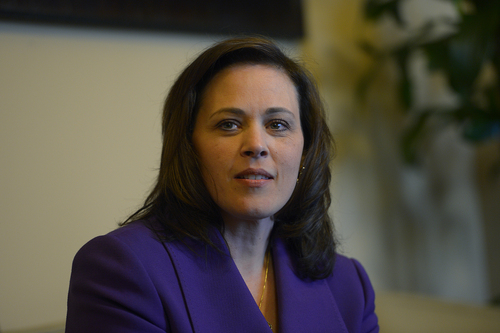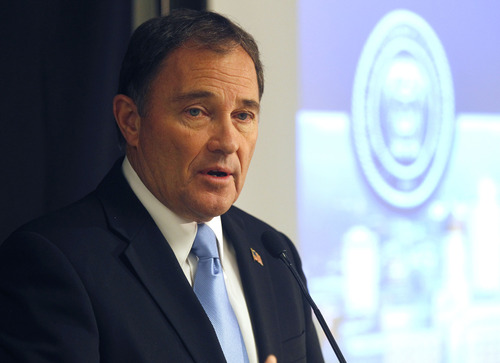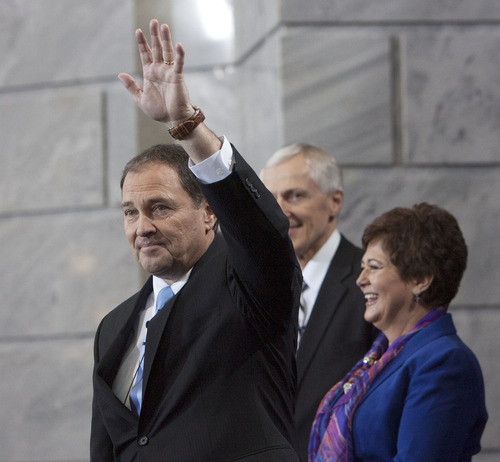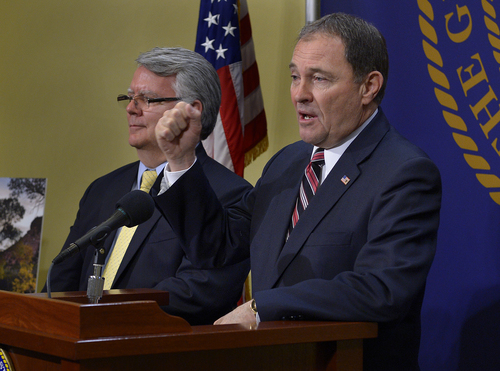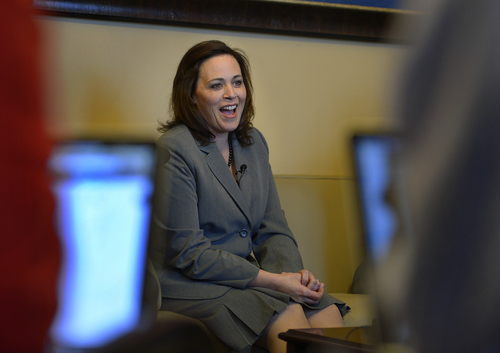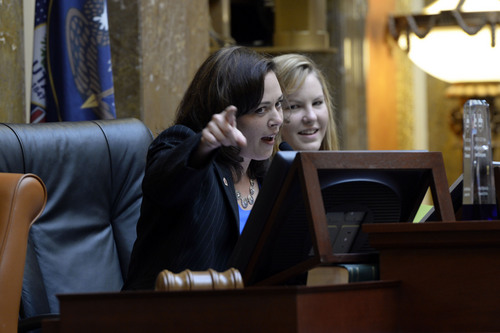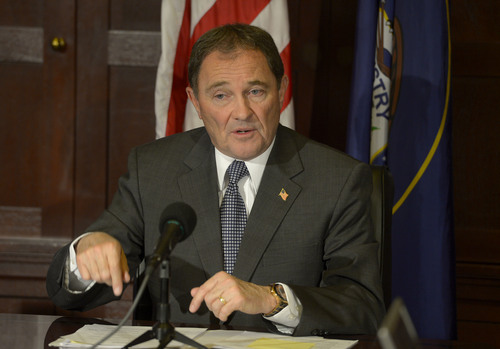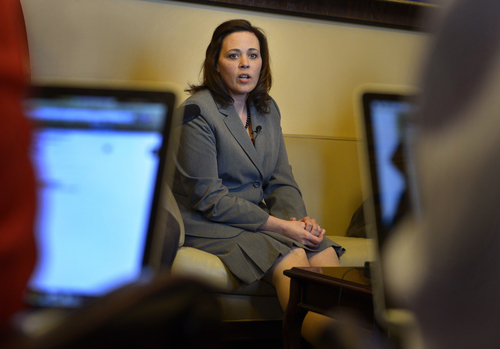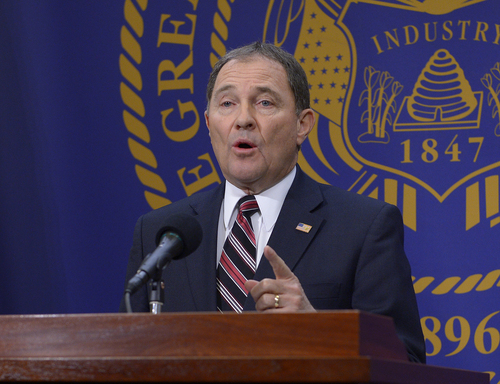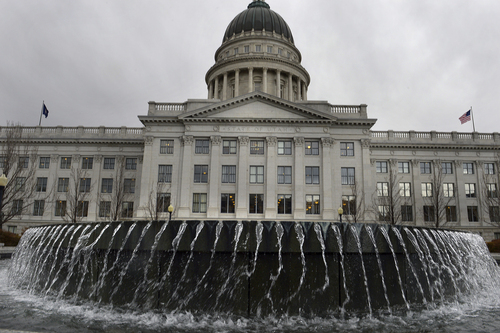This is an archived article that was published on sltrib.com in 2014, and information in the article may be outdated. It is provided only for personal research purposes and may not be reprinted.
This week, as the Utah Legislature enters the fourth quarter, it appears likely that the close of the 2014 session will be defined by how it opened.
Indeed, the gavel had barely dropped when House Speaker Becky Lockhart made her mark on the session, challenged the governor's leadership, calling him an "inaction figure" and staking out a hard-line opposition to taking any federal money for Medicaid expansion, calling it "a trap."
It may well be the jabs and barbs between Lockhart and Gov. Gary Herbert — and the assumption in the halls of the Capitol that Lockhart will challenge Herbert in 2016 — that will shape the pressure-packed negotiations over some of the most complex and contentious issues of the session.
"I don't know if we're just not used to that in Utah, because I think it's pretty regular in other states," said Senate President Wayne Niederhauser. "I'm not used to it, because first of all, I don't like the politics of it. I enjoy the policy and process. The politics, the games, I'd just a soon be direct and straightforward."
Perhaps the biggest battle will come in reconciling dueling health care proposals that have Herbert and Lockhart a world apart.
Lockhart has called Herbert's plan, which proposes drawing on federal money to subsidize health coverage for 111,000 Utahns, "straight-up Obamacare expansion."
Herbert called Lockhart's alternative "illogical" for refusing $524 million of dollars Utahns have paid to the federal government and using another $35 million in state funds to cover a fraction of the poor in his plan.
Likewise, they are at odds over what could be the speaker's signature initiative — and, if she runs for governor, a campaign centerpiece — a $200 million investment in education technology, the beginning of a quest to put a digital device in the hands of every student.
Herbert sees it as down the list of priorities and says that, while he's supported technology initiatives for years, the speaker's will have to be scaled down to make room for other budget issues.
—
Unusual friction • Dave Clark, who was House speaker until Lockhart unseated him, has witnessed the interaction between legislative leaders and four governors. And while there is inherent tension natural to the system of government, he has not seen anything like the jabs Lockhart took at the governor.
"There's always been tension and frank discussions, but typically those disc aren't … done on the front page of the paper or in opening [day] remarks," said Clark. "Generally those discussions are with real candor and statesmanlike, but they are done face-to-face. It's not a shot using the press for what I believe are political purposes."
Clark said it's obvious Lockhart is in full campaign mode, and has been for some time. But he worries that the ambition could interfere with the lawmaking process.
"What you're seeing is she's trying to create separation, trying to create political fervor and political differences," Clark said. "I think it's helpful to have some friction on policies, but some of these are going beyond policies and just trying to create political fervor and I don't think that's healthy."
Herbert and Lockhart downplay any talk of animosity or conflict.
Herbert says he's not looking ahead to 2016 and a potential challenge from the speaker.
"I don't even think about that. It's way to early for one thing," Herbert said in an interview. "We shouldn't be thinking about it. We should be thinking about solving problems."
The governor said he has known both the speaker and her husband, Stan Lockhart, for years — they both rose from Utah County political circles — and he considers them friends.
At the same time, when asked if he can negotiate with the speaker in light of her criticism, he said that, while they likely can come to agreement on most things "if we let political ambition and other things get in our way, we may have a distortion out there."
—
'Very cordial' • Lockhart says her relationship with Herbert is "very cordial."
"Gary and I are friends. We've been friends for a very long time," Lockhart said. "I have great respect for the governor and I believe it's mutual."
In a response her staff jokes is given so often it should be the ring tone on her cellphone, Lockhart says this session she is the House speaker and representative from District 64. The decision on whether to run for governor "is for another day."
If she wants to run, Lockhart — who has said she won't seek re-election this year — has been doing what candidates need to do. She has been elevating her profile, participating with representatives in numerous town-hall meetings around the state.
And she has been aggressively raising money, right up to the start of the legislative session — when lawmakers are prohibited from hosting fundraisers.
Lockhart had about $100,000 in the bank at the end of 2013 between three accounts she wholly or jointly controls. She raised nearly $39,000 more in the first few weeks of this year.
Herbert has not said whether he will seek re-election in 2016, but is in a strong position if he opts to run. He finished 2013 with more than $600,000 in the bank, and recently was named by The Washington Post as the most popular governor in the country.
For now, though, the clash in the Capitol is more pressing than any potential clash on the 2016 ballot.
Former House Speaker Greg Curtis, now a lobbyist, said there is always tension between the speaker and the governor and that there have been some policy disagreements between Lockhart and Herbert over the years.
—
Public vs. private • Curtis said he had some disagreements with then-Gov. Jon Huntsman, but they never spilled out onto the front page of the paper.
"He was immensely popular, as is Governor Herbert, and … publicly slapping at Governor Huntsman was a no-win game for me. But privately, we had some disagreements."
One of the biggest, Curtis said, was Huntsman's desire to impose an individual health insurance mandate. Curtis fought the governor over that and it never passed, but it was never a public battle, either.
But the events that have unfolded this year seem different, Curtis said. "It seems a little more personal."
Matthew Burbank, a political science professor at the University of Utah, said the potential that Lockhart might run against Herbert adds an additional layer of tension over the normal conflicts arising between the branches of government.
"When you compound [the normal tension] with this not-very-disguised effort to begin campaigning and show why the governor is not doing a good job and why perhaps someone else could do better, that complicates things," said Burbank.
Should the jockeying for political advantage become too intense, Burbank said, it could make it harder to cut the policy deals necessary in the closing days of the legislative session.
"I think there's the real potential for that to have an impact," said Burbank. Either the governor or speaker could deem it in their political interest to hold firm to a policy position rather than making a deal, and that could impede the Legislature from doing the work of the people.
But Curtis, the former speaker, said he thinks Lockhart and Herbert can set aside ego and political posturing and do their jobs.
"I think they just roll with it," said Curtis. "If you're here in the political arena as long as Speaker Lockhart, President Niederhauser, Governor Herbert, you have to learn to set aside your personal frustration and make a deal … the public expects a resolution."
Twitter: @RobertGehrke —
The big four: Issues remaining in the 2014 session
1. The budget: Lawmakers got a bit of good news, learning late last week that tax collections are up, meaning they'll have $47 million more to spend on various budget needs. The bad news is budget makers say it still won't cover all the demands. Top priorities include increasing education funding, giving a pay bump for state workers and keeping pace with the growth in the state prison system. All told, lawmakers will have about $400 million to add to a budget that will total about $13.5 billion.
2. Medicaid expansion: There are three competing plans for how to cover Utah's poorest uninsured residents. The House Republican leadership's plan eschews federal money, using $35 million in state money to pay health costs. Senators appear to be lining up behind a plan that would use federal funds to subsidize private health insurance plans for individuals making less than $11,670 a year. Gov. Gary Herbert has proposed seeking a federal block grant and using $258 million to subsidize coverage for people making up to $15,500.
3. Education technology: Early in the session House Speaker Becky Lockhart announced a major push to get a digital learning device in the hands of every one of Utah's more than 610,000 students. Her proposal has been scaled down to $200 million, but Herbert and Senate leaders still think that might be too much and say it may need to be slimmed down more.
4. Count My Vote: A deal struck to change Utah's nominating system and avert the Count My Vote ballot initiative broke down late Friday but was salvaged Saturday. If the bill passes, it would let candidates for office qualify for the primary ballot by gathering enough signatures, rather than having to go through the party's caucus and convention system. If the deal falls apart again, Count My Vote has gathered more than 100,000 of the 102,000 signatures needed to be on the November ballot with a plan to nominate candidates through direct primaries.


